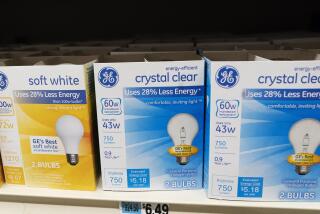Energy Use Standards Under Attack : Any weakening of rules by Congress could injure both consumer and national interests
Recent turmoil in a small but apparently successful program within the U.S. Department of Energy sheds light on what seems to be a troubling new relationship between Congress and the American consumer.
The 1987 National Appliance Energy Conservation Act established minimum federal energy use or efficiency standards for household appliances. The act, since amended to include a larger set of products, required the DOE to set feasible standards for appliance manufacturers. The move toward federal standards resulted in part from the requests of several large appliance manufacturers to substitute one national energy efficiency standard for the patchwork of state standards that had developed.
The federal approach made theoretical sense in 1987 and has made financial sense for consumers since. Standards already in place--for refrigerators, freezers, washers and dryers--save consumers about $1 billion in energy costs annually, according to the DOE, and future standards for other types of appliances will multiply those savings. Energy conservation is more than just a pocketbook issue; reducing U.S. need for foreign energy and preserving air and water quality depend on the more efficient use of natural energy sources.
Nevertheless the early enthusiasm of some appliance makers for this program has soured in recent years. Industry concerns have centered on the costs of meeting the efficiency standards, and the loss of American jobs to producers abroad that can meet the standards with cheaper labor. But job losses to countries with lower labor costs, while real and distressing, are hardly a function of the standards alone.
Some manufacturers also argue that the federal standards are now unnecessary, that market forces alone--consumer preferences--will push them toward more energy-efficient products. But evidence to sustain that position is inconclusive.
The new Congress has offered those dissatisfied with the federal standards an opportunity to make short-term changes in the requirements and possibly permanent ones as well. Earlier this year, Congress imposed a one-year moratorium on the proposed new standards for the energy efficiency of any appliances.
Congress may now go further. Hearings are being planned in the House energy and power subcommittee to review the entire standards program. Some manufacturers not only question the continued necessity for any federal standards but wish to preempt any new state standards. Weakening or eliminating these standards is hardly in the national interest or the interest of U.S. consumers.
More to Read
Inside the business of entertainment
The Wide Shot brings you news, analysis and insights on everything from streaming wars to production — and what it all means for the future.
You may occasionally receive promotional content from the Los Angeles Times.







